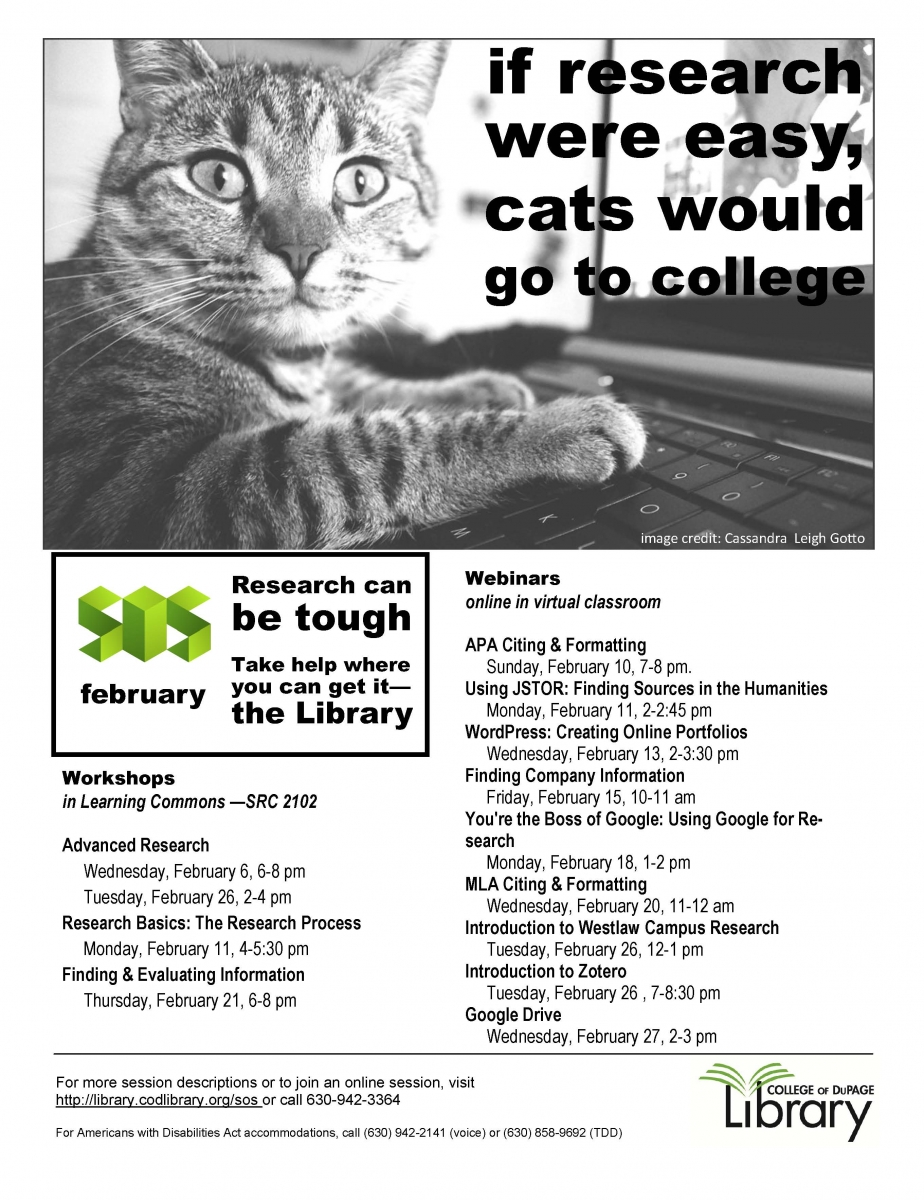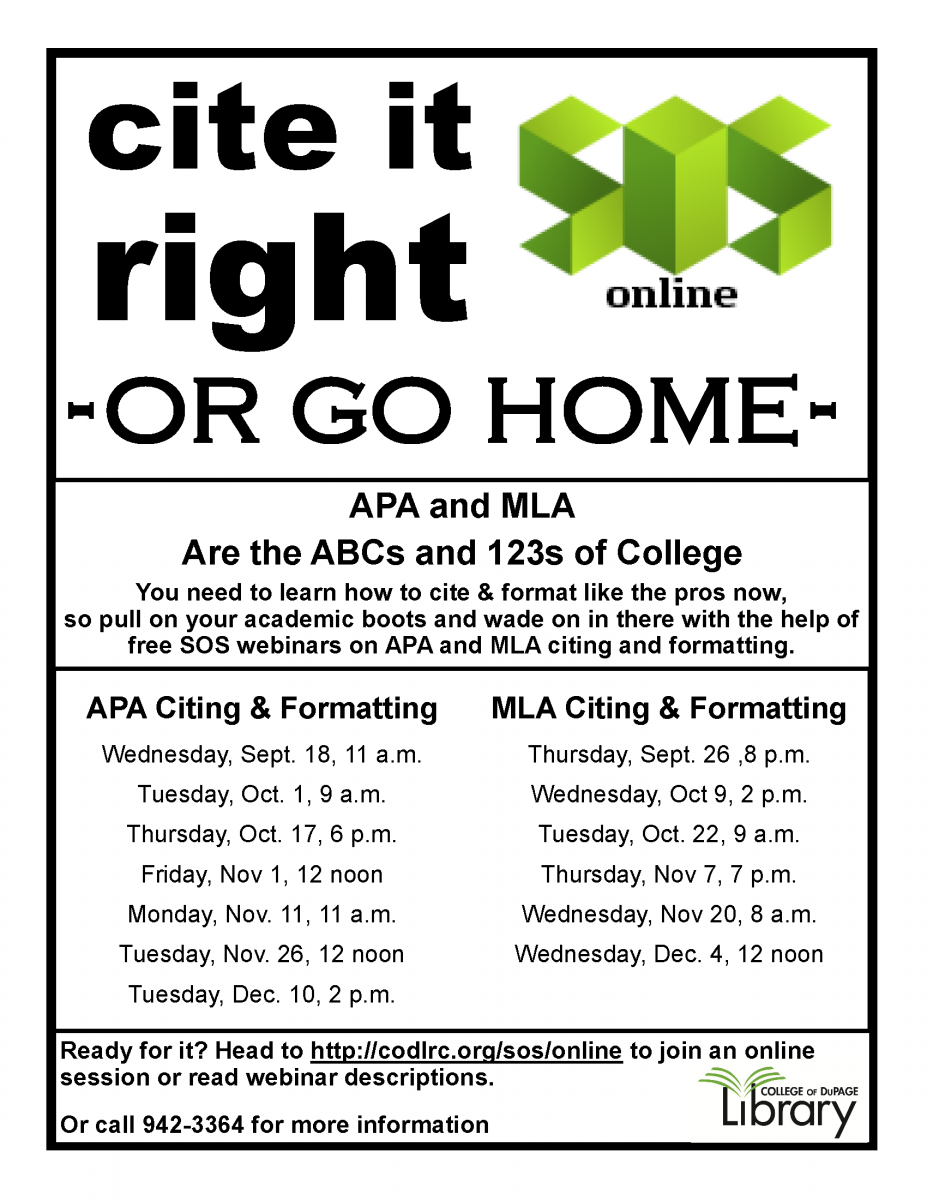The College of DuPage Library is proud to nominate the Library’s Instruction Committee for their innovative efforts in revamping, energizing and expanding the Information Literacy Instruction Program. Committee members Laura Burt-Nicholas, Jason Ertz, Jennifer Kelley, Christine Kickels, Colin Koteles and Ken Orenic have been instrumental in designing and promoting a flexible and inclusive program that has the support of College faculty, administrators and, most importantly, students.
Background
College of DuPage Library has a long and successful history of providing information literacy instruction to the more than 26,000 students who attend COD every semester. Under decades of leadership by ACRL Community and Junior College Libraries Section Program Award winner Diana Fitzwater, the COD Library’s Instruction Program was expanded to include a successful IL course for faculty. Faculty members who completed this course received mentorship from their liaison librarians and formed lasting partnerships with the library.
The resulting buy-in from teaching faculty has been the foundation of the success of our current Instruction Program-- annually, College of DuPage’s nine faculty instruction librarians provide 1000 one-shot instruction sessions reaching approximately 18,000 students.
Additionally, since 2001, the Library has offered free information literacy and research skills workshops to students, faculty, staff and community members. For over a decade, the SOS Workshop series has provided our patrons with co-curricular instruction in everything from employing advanced search techniques to using Google for research; navigating Yahoo! directories to creating Delicious linkrolls; citing sources to creating websites with Wordpress.
More recently, the Library’s Instruction program has expanded exponentially, largely to accommodate the to the rapid growth of the COD’s Online College, but also in response to the needs of our students, the changing environment of information and the physical changes of our Library as we entered a two-year renovation program. In order to provide information literacy instruction to our distance learners as well as our population of working, commuting, and otherwise busy students, we have begun to explore and employ multiple modes of delivery.
With the institutional acquisition of the Adobe Connect web conferencing system, we have added webinars to our SOS program and can easily provide synchronous online instruction to online and off-campus students. One of the most exciting developments from within the Instruction Program, however, has been the introduction and adoption of Information Literacy Modules. Designed to support the inclusion of the College’s Information Literacy General Education Outcomes in courses, the six units that comprise the IL Modules are available for instructors to import into any Blackboard course shell.
Since their creation in 2010, over 400 students have used the IL Modules in face-to-face and online courses ranging from English to Economics. With the support of teaching faculty, the Modules provide basic information literacy instruction to entire classes that may never come to the Library as well as foundational instruction to on-campus classes, allowing librarians to introduce higher-level research skills in one-shot sessions.
This nomination packet will highlight the key components of the College of DuPage Library’s innovative Information Literacy Instruction Program expansion and discuss the strategies that the Instruction Committee has employed to ensure its success.
Flexibility
The expansion of the Program has resulted in innovative practices which allow us to teach a more diverse collection of information literacy options and offer them in a way which permits flexibility in delivery format, content and attendance. These practices include adding webinars to our workshop program, offering both embedded and synchronous online instruction and the development of online tools that instructors can incorporate into their curriculum.
In the fall of 2011, the COD Library debuted its online SOS sessions. In addition to the 30 classroom workshops, that semester’s SOS schedule included 8 webinars on subjects as diverse as “Finding Company and Industry Information,” “Accessing E-books” and “How to Search Science Databases.”
By launching this limited webinar series, the Library became one of the first areas on campus to take advantage of the College’s acquisition of Adobe Connect. The flexibility inherent to synchronous online sessions allowed librarians to offer sessions that were more concise (most run 1 hour to 1-½ hours) on days and at times when we previously had little face-to-face attendance. Additionally, this format encouraged librarians to develop sessions targeted to specific disciplines or focused on individual tools.
The SOS Workshop and Webinar program now reaches nearly 500 students every year, providing both hands-on classroom research workshops and the shorter, more focused webinars. The addition of the webinar component of the program also allows us to reach the thousands of students who take their classes online or at one of the College’s many off-campus locations.
Alternative Modes of Delivery
Another key innovation in our Information Literacy Instruction Program has been the development of the Library’s Information Literacy Modules.
The Modules consist of six tutorials, each including a link to an interactive tutorial, supplementary material, assessment and a summary of objectives. Once uploaded into a course, the instructor can enhance the content with discipline-specific resources, further develop assessments or pick individual units for use by the entire class or for individuals requiring remediation.
Built on a revision of University of Washington Libraries’ Research 101 tutorial, the content introduces students to basic and essential information literacy concepts, allowing librarians and teaching faculty to work with students on higher-level research skills and strategies.
Feedback from students and faculty using the Information Literacy Modules has been positive and enthusiastic. Many students, in English, Sociology, Religion and other disciplines, have commented that they found the content useful and practical and that they now feel better positioned to take on future research projects.
- "I thought the tutorials were very informative and helpful! I think everyone should read these tutorials so they can have a better understanding of how to properly research."
- "Overall I liked this. I thought the quizzes throughout the tutorials were very helpful in actually learning what I just read."
- "I really appreciate this set up. I have never been properly introduced to using the library online and this was amazing!!! I feel that I have something to turn to when I run into issues while doing my research paper. Thank you!!!"
- "Any general English information is easier to take in when it is spread out with many examples. The mini quizzes help to better understand what has been taught and allow for the student to reuse what they learned. This could truly be helpful in any subject without being overwhelming."
- "Really liked viewing the database module. I never know how to use them and I feel this module helped me to have a better understanding. Thank you!"
- "I really enjoyed accessing and reading into this information. It was very informative and helpful. I often take for granted the rules of real research and I'm glad I went through this process of learning more about it. Thank you!"
- "I think that the tutorials introduced me to an extremely better method of researching than i have ever had before (if any) and it covered topics and techniques very well! Although it did leave me wanting to know more about the wildcards and truncation symbols which i had no idea even existed! "
Collaboration
Many of the projects we’ve undertaken at the College of DuPage Library could never have succeeded without the help of our many partners outside of the Library. While developing the Information Literacy Modules, for example, our instruction team worked closely with two dozen instructors who provided valuable feedback and piloted the program in their classrooms and online courses before we made the content available college-wide.
Currently, the Library’s Instruction Committee is partnering with the College’s English Composition Steering Committee to revise the IL Modules for use in all English 1102: Composition II courses. The adoption and incorporation of the Modules into this course would allow the Library to provide information literacy instruction to hundreds of College of DuPage students every semester.
Marketing and Outreach
The sheer number of offerings have encouraged strategic marketing and novel outreach solutions, including popular and irreverent email and flier campaigns. As is the case with many libraries, the College of DuPage library does not have a dedicated marketing librarian, but rather outreach efforts are coordinated by a small team, including faculty librarians and the Library director. Most campaigns are created in-house using little more than Microsoft Publisher and Creative Commons licensed images.
Our library has the additional challenge of getting the attention of a large, non-captive audience of commuting students, adjunct and full-time faculty, staff and community members, so we have relied on consistent branding in our fliers, handouts and emails to ensure instant recognizability of our many offerings.
Recent SOS Program campaigns have included “If Research Were Easy…” and “We Love Research: Free for You, Fun for Us.” Regular email updates to faculty include links to the online workshop and webinar schedules, reminders about scheduling instruction sessions with liaison librarians and handout attachments for classroom dissemination.
Lessons Learned
Name recognition. With an expanding program full of new offerings, having easily identifiable and recognizable names can help provide a sense of stability. Every email that goes out to the College Community includes a logo identifying the program, event or service that is the subject of the communication.

Additionally, the chair of the Instruction Committee serves as the point-person for the Instruction Program: sending emails and updates, fielding questions, coordinating schedules and standing in as the readily identifiable contact person for the Information Literacy Instruction Program.
As a result, faculty recognize the various ‘brands” offered by the Instruction Program. Our communications stand out at a glance in email inboxes and can be retrieved easily based on the simple logo presence. Consistency of the sender also provides instructors with a sense of continuity and a single name and set of contact information to associate with the program when questions arise.
Identifying Partners. We have learned that our classroom faculty are our biggest advocates and the key to our success. On a campus with a transient population and remarkably few bulletin boards, it’s a constant challenge for the Library to reach students with updates, events and offerings. In addition to relying on instructors to share our e-mailed fliers, we can count on many of them to incorporate content from our Information Literacy Program into their curriculum. Whether instructors embed the Information Literacy Modules into their Blackboard course, require SOS workshop attendance, offer extra-credit for completing a webinar assessment or refer individual students to Research 101, our program thrives because hundreds of full-time and part-time faculty members support our mission and recognize the importance of information literacy instruction.
Information literacy has been an integral part of the College’s curriculum for over a decade, beginning when the Information Literacy Across the Curriculum (ILAC) Continuous Improvement Team submitted and received approval for its Action Plan in 2003. That ILAC Action Plan created the foundation for embedding information literacy as a competency within the College’s curriculum and is now the basis of our successful program.
An information literacy instruction program cannot, however, remain static. As modes of instruction and student needs change, our program changes, too-- adopting new methods of delivery, creating stronger collaborative relationships across campus and developing a broader, deeper, more robust curriculum that supports our students not only while they are here at the College of DuPage, but throughout their academic and vocational careers.







Information Literacy Modules presentation for Distance Library Services Conference
Marketing SOS Workshops presentation for Illinois Library Association Conference
Marketing SOS Workshops presentation for Information Literacy Summit
The following articles discuss the Library's Information Literacy Modules.
Kelley, Jennifer, "Off the Shelf and Out of the Box: Saving Time, Meeting Outcomes and Reaching Students with Information Literacy Modules" (2012). Library Scholarship. Paper 15.
http://dc.cod.edu/librarypub/15
Fisher, Mitch, “Online Teaching Tips–Encouraging Critical Thinking and Information Literacy in an Online Class” (2013). COD Online Newsletter.
http://goo.gl/mAkX8o
